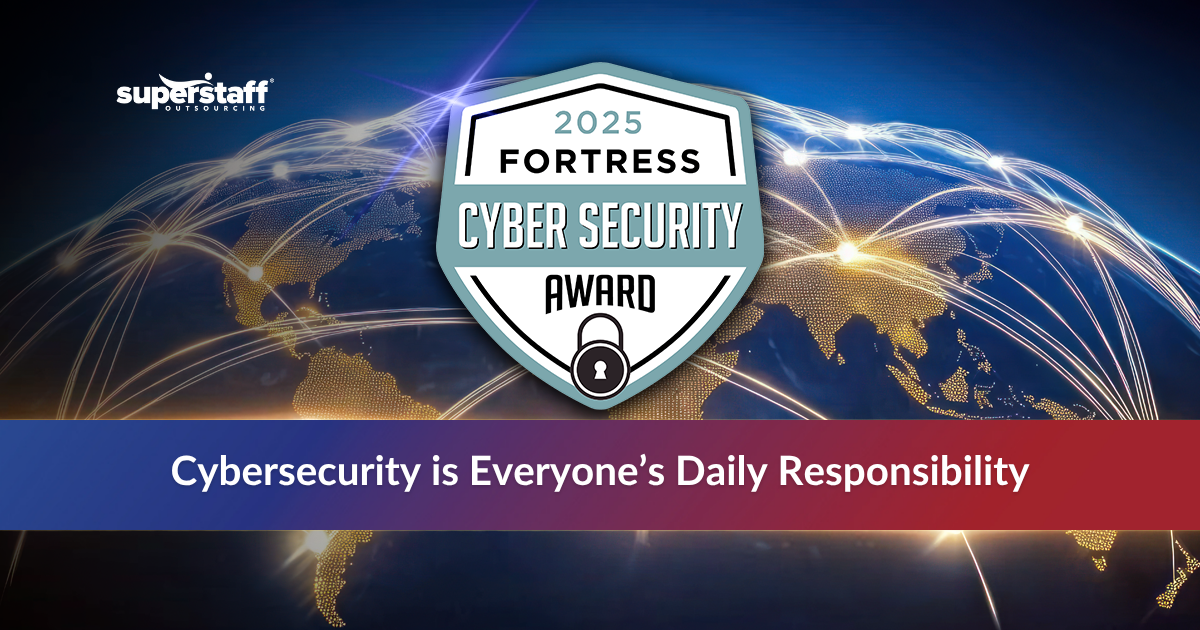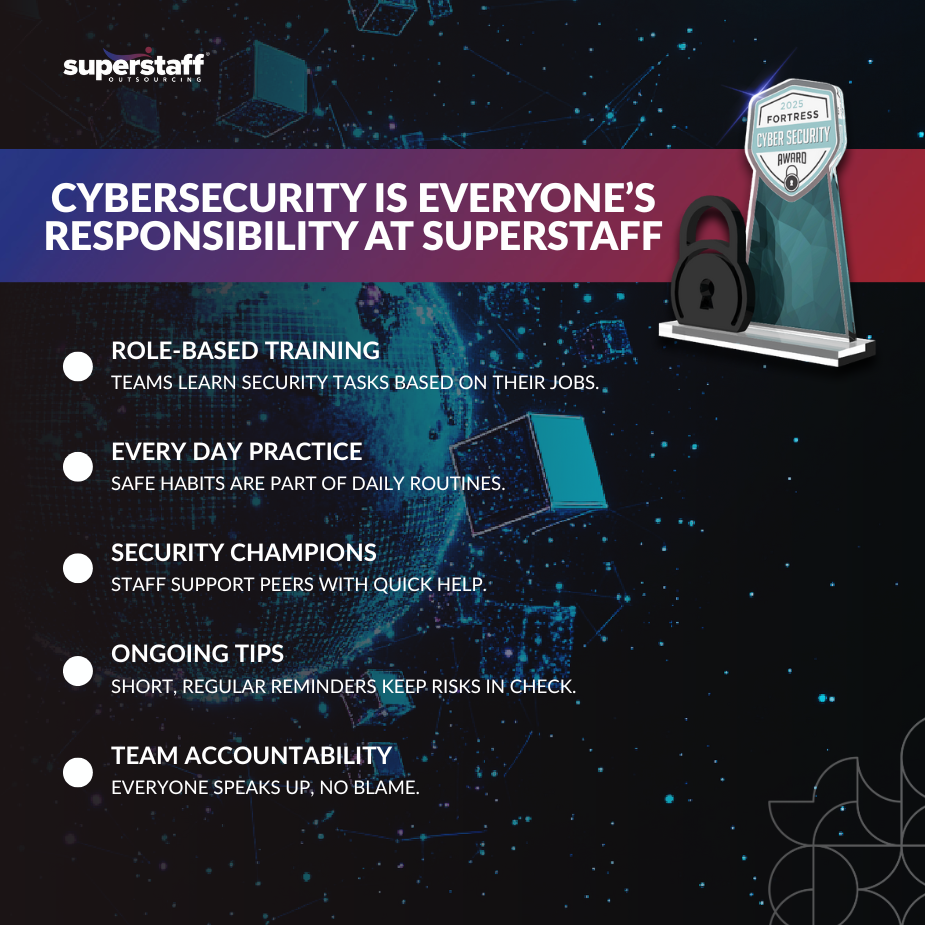
Cybersecurity issues often start with simple mistakes. One weak password or a click on a fake email can lead to big problems. In fact, 88% of data breaches happen because of human error. At SuperStaff, company-wide cybersecurity is taken seriously. The company believes that cybersecurity is everyone’s job, not just the IT team’s.
Instead of only relying on technical tools, SuperStaff focuses on its people. Employees are trained, supported, and trusted to make safe choices. Because of this, SuperStaff has earned awards for strong security practices—and more importantly, built a company where every person helps protect data.
Moving Beyond IT—Making Cybersecurity a Company-Wide Priority
At SuperStaff, cybersecurity is not just an IT task. It’s part of how every department works. From HR to Finance to Operations, everyone has a role to play. The company understands how to create a company-wide cybersecurity culture through employee training, ensuring each team knows its responsibilities and risks.
1. Role-Based Training
Instead of giving everyone the same generic training, SuperStaff customizes it by role. Human Resources learns how to guard sensitive employee data. The Finance team focuses on protecting payment information and financial records.
Customer service teams learn how to handle client data safely. This targeted approach ensures that each team understands what risks they might face and how to avoid them.
2. Daily Integration
Security isn’t a once-a-year seminar. It’s built into everyday activities. From regular check-ins to team meetings and even simple reminders in internal messages, cybersecurity stays front and center. This constant exposure helps employees build habits that stick.
Over time, these habits become second nature, like locking your screen when you walk away or double-checking links in emails.
3. Security Champions
Some employees are chosen as “security champions” for their teams. These are regular staff members, not IT professionals, who help guide their coworkers. They’re trained to answer basic questions, help solve small problems early, and share updates about new risks. This peer-based support makes security more approachable and less intimidating.
4. Ongoing Reminders
No one can remember everything from a single training session. That’s why SuperStaff sends short, regular messages that reinforce cybersecurity best practices for employees. These reminders might cover how to spot a phishing attempt, how to store files securely, or how to report a potential issue. These small touches help keep everyone informed without adding pressure.
5. Shared Accountability
Cybersecurity works best when everyone feels responsible, not afraid. At SuperStaff, teams are encouraged to check their own habits and report risks early. This creates a culture of teamwork instead of blame.
Employees are more likely to speak up when they know they won’t get in trouble for asking a question or pointing out a mistake.
Real-Time Readiness Through Hands-On Learning
People learn best by doing, not just by reading or listening. That’s why SuperStaff uses real-life examples and interactive training to prepare employees for security challenges.
-
Simulated Threats
SuperStaff regularly sends out fake phishing emails to test how employees respond. These emails look real but are harmless. They’re meant to see who clicks and who reports the message. If someone falls for the fake email, it becomes a learning moment, not a punishment. Over time, employees become quicker and more confident at spotting real threats.
-
Hands-On Activities
Training sessions include role-playing, practice drills, and other activities that get employees involved. For example, they might walk through how to report a lost device or what to do if they see suspicious activity. This approach builds real understanding and helps staff remember what to do when it matters most.
-
Immediate Feedback
After each exercise, employees get fast feedback. They learn what they did well and what needs improvement. This direct approach helps people grow without waiting for a yearly review or test. Quick learning loops keep skills sharp.
-
Performance Tracking
SuperStaff tracks how teams perform in training. If one department struggles more than others, the company steps in with extra support. This might mean more training sessions, new materials, or updated exercises. The goal is to lift everyone up—not leave anyone behind.
Sustaining ISO 27001 Compliance Through People
Getting certified for ISO 27001, a global security standard, is a big deal. But keeping that certification is even harder. SuperStaff stays compliant by putting people at the center of its security process.
1. Internal Auditors
Instead of only depending on outside reviewers, SuperStaff trains employees to perform internal audits. Staff members from different departments are taught how to check their own work against ISO standards. This helps catch problems early and keeps the team ready for formal reviews.
2. Cross-Functional Teams
Security isn’t handled by one group alone. Teams from different departments work together to manage risks and review policies. This ensures that the company’s security plans make sense for all parts of the business—from sales to tech to operations.
3. Routine Checks
Processes and systems are reviewed regularly. These routine checks help identify gaps or outdated methods before they become risks. Staff are also encouraged to suggest improvements. It’s not just about following rules—it’s about making security work better every day.
4. Employee Ownership
SuperStaff makes sure every employee knows they play a role in meeting security goals. This ownership motivates people to do the right thing, even when no one is watching. Because of this mindset, compliance doesn’t feel like a chore. It becomes part of how people work.
Leadership Sets the Tone
Culture starts at the top. At SuperStaff, leaders don’t just support cybersecurity—they live it.
-
Visible Support
Leaders show up. They attend training sessions, talk about security goals in meetings, and make time to answer questions. Their presence sends a clear message: cybersecurity matters here.
-
Security Campaigns
The company runs regular events to keep things fresh and engaging. For example, during “Security Month,” employees might join fun games, answer trivia questions, or complete mini-challenges that reinforce good habits. These events make learning more enjoyable and help embed company-wide cybersecurity.
-
Recognition Systems
When someone follows best practices or reports a risk, they get noticed. A simple thank-you, a shout-out in a meeting, or a small reward shows that good behavior is appreciated. This keeps morale high and encourages others to do the same.
-
Two-Way Feedback
Leadership doesn’t just talk—they listen. If training is confusing or a policy isn’t working, staff can speak up. Feedback helps improve security programs and makes sure they stay practical and useful.
Security Is the New Standard of Excellence
At SuperStaff, data protection is part of everyone’s job. It’s built into daily routines, supported by real training, and reinforced by leadership at every level. By empowering every employee, fostering a culture of awareness, and prioritizing hands-on learning, SuperStaff creates a workplace where security is second nature.
This people-driven approach recently earned SuperStaff the 2024 Fortress Cybersecurity Award, a recognition of the company’s outstanding ability to safeguard client data through proactive and inclusive strategies. It’s not just about winning awards—it’s about building lasting trust.
If you’re looking for an outsourcing partner that takes company-wide cybersecurity seriously at every level, SuperStaff is ready to support your goals—safely and securely.







